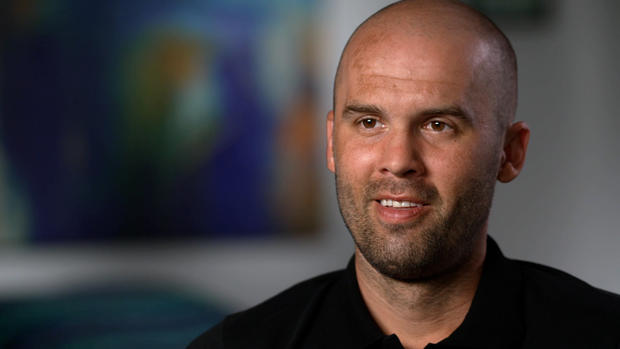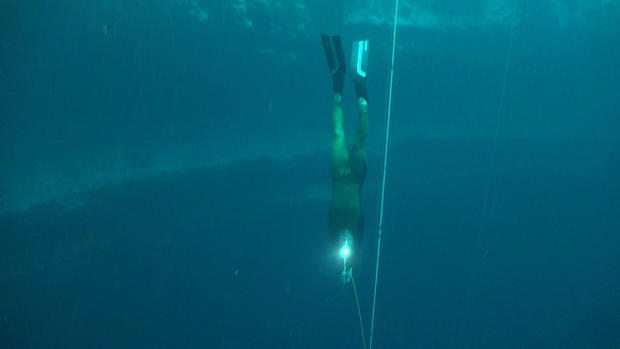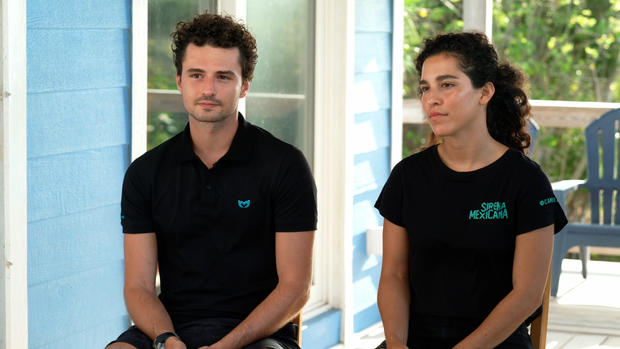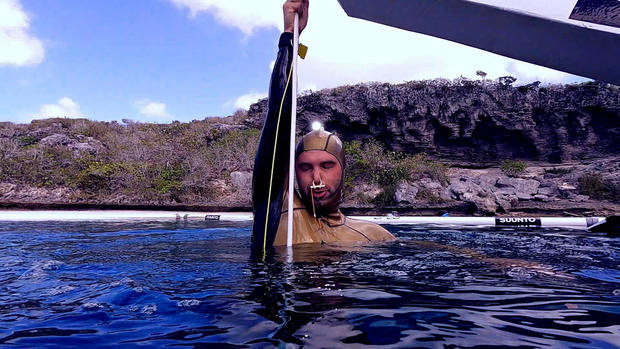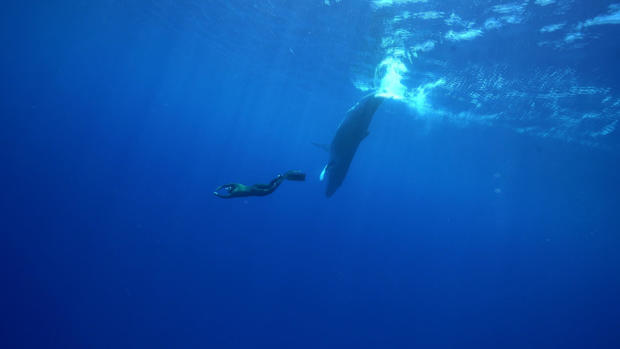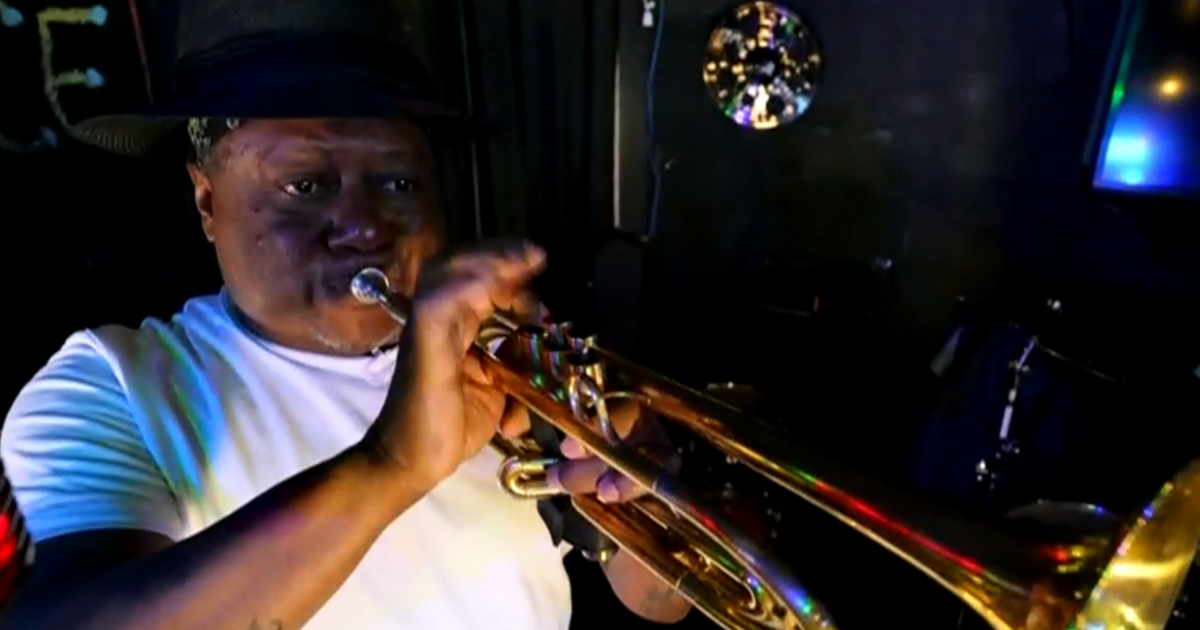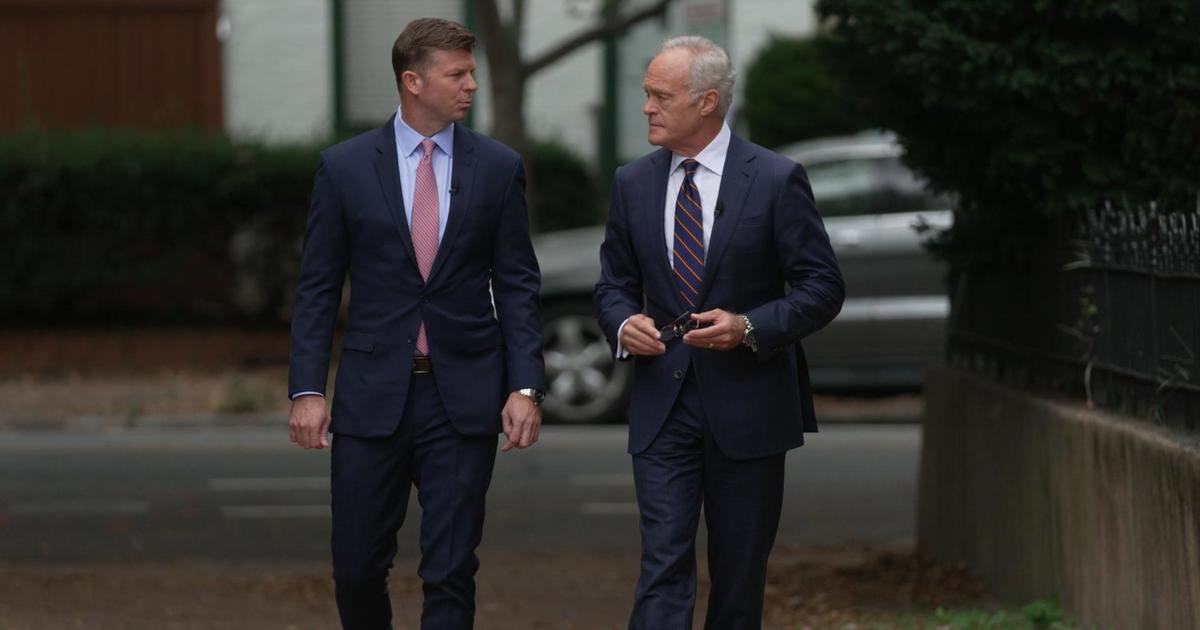Alexey Molchanov on diving more than 39 stories deep while holding his breath for four and a half minutes
If you've never heard of free diving, imagine this. Launching yourself hundreds of feet into the sea with little more than a mask, a heavy dose of bravery and one deep breath.
Spear fisherman and pearl divers have been free diving for thousands of years. But a growing number of people are now doing it for sport.
There are hundreds of competitions around the world with athletes testing their limits, and good sense, by diving as deeply as they can without scuba gear.
You may remember, our Bob Simon gave us a first glimpse into that world about eight years ago.
But now there is one man who is dominating the sport. 34-year-old Russian free diver Alexey Molchanov. He is known within the diving community as "the machine" -- the undisputed king of the deep.
Off the turquoise coast of Long Island in the Bahamas you'll see Dean's Blue Hole. From overhead it looks like an ink well. 663 feet deep, it is the perfect place for dozens of the worlds elite free divers to try and re-write the sport's history. This is the annual "Vertical Blue Competition."
We went there to meet Alexey Molchanov.
To watch him glide through the water is to glimpse something other-worldly. He looks part-Golden Poseidon, part-porpoise, kicking from the sparkling blue water into the dark.
Molchanov can dive more than 39 stories deep – while holding a single breath for nearly five minutes.
Sharyn Alfonsi: It doesn't seem like a good idea to dive that deep and to hold your breath that long.
Alexey Molchanov: Right. (LAUGH) For me it does.
Sharyn Alfonsi: It does?
Alexey Molchanov: Right. I enjoy finding new boundaries and pushing them further because I know I can. I know through all these years and like thousands of hours of training and diving how well I can use my oxygen, how slowly I can use it and how efficient is my technique.
Sharyn Alfonsi: What does it feel like?
Alexey Molchanov: It feels very much like flying actually. Very much like freedom. Just pure joy of flying, like staying and feeling no urge to breathe.
Sharyn Alfonsi: But you're enjoying it.
Alexey Molchanov: Yep. Yeah, without joy it doesn't work.
We were given the sports equivalent of a side-line pass.
Our photographers circled beneath the surface as free divers tested themselves in four disciplines. With or without fins. With or without the use of a rope to pull them down.
Going into this year's competition, Molchanov held the world record in three of the four disciplines and wanted to break them all. We watched as he prepared for his most ambitious dive attempt 430 feet -- more than the length of a football field.
With judges looking on, he takes in his final breaths. He looks like a goldfish desperate for water, he's packing his lungs with air, then, slips beneath the water's surface, his whale-like monofin helping him fight buoyancy.
At around 65 feet he drops his arms to his side and enters free fall. His lungs are now a third of their surface size and he starts to sink. He is clipped to a dive line that can yank him back to safety.
Once he reaches his designated depth, he grabs a tag to prove he's gone the distance.
He's already been under water for almost two-and-half minutes.
Then, he begins the most dangerous part of the dive.
With his last reserves of air and his lungs now a tenth of their normal size, he transfers air between his mouth and sinuses, equalizing the pressure in his body, to prevent his ears from rupturing and makes his way slowly toward the light.
A team of safety divers circling along the way.
But that's not it. He then has to prove he's alert - not disoriented by the water's crushing pressure – by giving the okay sign within 20 seconds of surfacing and then presenting his tag.
If he's unable to do this in this order, the dive is disqualified.
Molchanov does it. Diving 430 feet, for 4 minutes and 33 seconds, setting a new world record with a single breath.
Alexey Molchanov: In free diving during the dive, it's very important to be zen, very important to be relaxed and not to think about the goal, how far or deep you want to go because that will damage your mind state, your current state where you need to stay to be very focused, very still and relaxed.
Sharyn Alfonsi: People think of free diving as this very extreme sport. How dangerous is the sport of free diving?
Alexey Molchanov: The most dangerous side of free diving I would say is if you go out to sea and free dive alone, then that's very dangerous. Because there is a risk of blacking out underwater.
Blackouts happen when divers push their limits too far,
And oxygen reserves are drained. A fate that claims the lives of about 60 recreational free divers each year.
That's something the world of competitive free diving has worked hard to prevent by adding safety divers, underwater monitoring and doctors at every event.
There has only been one death during a competition in the last 20 years.
Sharyn Alfonsi: Have you ever had a blackout?
Alexey Molchanov: I had. When I was a beginner free diver I would be very stubborn and I would push it to the end. I wouldn't listen to the signals my body gives to me. And now I have much better awareness of what's going on.
Sharyn Alfonsi: When I was sitting out there watching you guys dive the other day and I was watching the competitors, a lot of 'em would come up and they would gasp for air. And you emerged from the water, and you smiled.
Alexey Molchanov: I think that's an essence of being able to do really deep dives and records. Like, it's very hard to do those deep dives being stressed and it would look from outside that it's really easy. But it's not. Of course, by the time I finish my dive, it's hard. My muscles are tired. They're heavy, they-- sometimes burning, muscles will be burning. And, I will feel that. But still I surface, and I train this positive mindset. So I, like, do a couple of recovery breaths. And then-- just this difference between a few seconds before and now, like, when I got those couple of breaths is so big-- that it just gives so much joy.
Alexey Molchanov's famously easy temperament is how 'the machine' earned his other nickname: "the golden retriever."
Sharyn Alfonsi: What's it like to compete against him?
Arnaud Jerald: For me it's like a dream. All the time he's laughing or smiling. All the time he enjoys life. And it's beautiful.
Arnaud Jerald and Camilla Jaber are friends and competitors with Molchanov. Jaber holds a national record for Mexico and Jerald has French records to his name.
Sharyn Alfonsi: What makes him so good?
Camila Jaber: That is a very good question.
Arnaud Jerald: I think experience.
Camila Jaber: He has a very like, sportsman mindset. So, this confidence in himself, in his training, on what he believes on growing the sport. He's also encouraging and pushing other athletes to become better.
25-year-old Jerald is one of the only divers to have beaten one of Molchanov's records.
Sharyn Alfonsi: Do you push each other, do you think?
Arnaud Jerald: Yeah, we push each other – not too much because I'm less competitive than him. I prefer a more romantic to Alexey.
Sharyn Alfonsi: He's more competitive, you are more French?
Arnaud Jerald: Exactly.
Only a Russian might think this was a good idea.
Last year, Alexey Molchanov swam beneath a frozen quarry outside of Moscow. Holes were cut in the ice in case he needed to surface but he held his breath for nearly three minutes, swimming nearly 600 feet across.
This past spring, he stepped into the ice in Siberia, for a swim. It was 14 degrees outside when he broke another world record: the deepest dive under ice with fins. On a single breath, Molchanov swam to 262 feet deep in 37-degree water.
Sharyn Alfonsi: That does not sound joyful to me.
Alexey Molchanov: That was not. It wasn't as joyful as here for sure.
Sharyn Alfonsi: And does the cold add additional stresses to your body?
Alexey Molchanov: It does. It makes the face numb. And you just lose heat very fast and it-- it gives you a very short period of time when I was able to dive. And I would need to focus fast.
Molchanov gets 'dive ready' on land. He does daily stretches and deep breathing exercises - something he calls "lung gymnastics" - to build diaphragm, rib and back mobility.
Alexey Molchanov: I will just demonstrate. It's inhale, (BREATHES) full inhale, and then it's relaxation. And then there's this portion in the neck and in the mouth, which I-- which I just grab and then I push it in the lungs.
Researchers who studied Molchanov and the impact of free diving on his body estimate he takes in two gallons of air before a dive.
It's a technique he learned from his mother, Natalia Molchanova, considered the greatest free diver of all time. She came to the sport at 40 years old after a successful swimming career in Russia.
Alexey Molchanov: She was my coach in swimming. And I was following her trainings. We would go together to the pool. She would do her training, I would do my training. So this transition to free diving and me following her as a free diver coach, that was very natural. She started to be like best, very, very fast and yeah, I was proud. I was very proud of her.
Sharyn Alfonsi: What did she teach you about the sport?
Alexey Molchanov: The main thing that she taught me about free diving is that I should enjoy it. It's not about records. Numbers come later.
Together they took on the free diving world and commanded it. Alexey achieved his first world record at 21.
By the age of 53, his mother Natalia held 42 world records and 24 gold medals.
In 2015, she was teaching a free diving lesson off the coast of Spain when she disappeared. Her body was never found.
Sharyn Alfonsi: At that point, you kept free diving. No one would've blamed you if you had said, 'You know what, I'm done.' Why did you keep going?
Alexey Molchanov: I felt that free diving is actually the best thing for me to do. It was the best therapy being in the water.
Sharyn Alfonsi: Really?
Alexey Molchanov: Yeah cause it just helped me to be like in peace and helped to just live through that.
Molchanov seems most at peace underwater, chasing whales, not records, and on land with his new son and wife Elena, a former Olympic swimmer. The family is expanding the free diving schools his mother started, certifying hundreds of instructors in 20 countries.
And as the sport grows, Alexey Molchanov seems confident about his place in it. At 34, he holds two dozen world records.
Sharyn Alfonsi: You don't think you've reached your limit to free dive as deeply as you could?
Alexey Molchanov: No, no. I don't think that. I know with all the skills I have, with all the mind-control I have, I can go deeper and so because I can, then I will.
Produced by Ashley Velie. Associate producer, Jennifer Dozor. Broadcast associate,Elizabeth Germino. Edited by Peter M. Berman.
